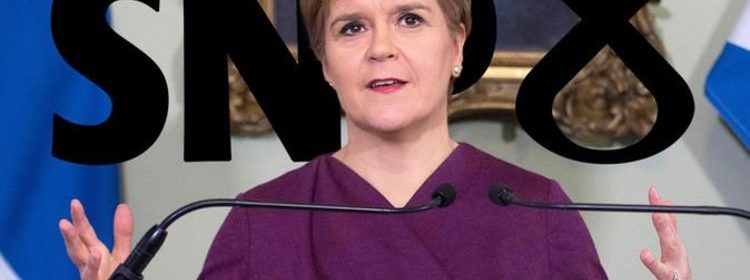SNP to BAN Life in UK citizenship tests under independent Scotland to be more ‘inclusive’

SNP minister challenged after accusing UK of excluding party
We use your sign-up to provide content in ways you’ve consented to and to improve our understanding of you. This may include adverts from us and 3rd parties based on our understanding. You can unsubscribe at any time. More info
Under Prime Minister Tony Blair in 2005, the Life in the UK test sees anyone seeking Indefinite Leave to Remain in the UK or naturalisation as a British citizen take a test with 24 questions. The test has been criticised as a “bad pub quiz”, with the SNP now looking to scrap the entry exam should Scotland become an independent country.
At this week’s SNP conference, from September 10 to September 13, a resolution on “Scottish citizenship for New Scots” calls for no tests like the “Life in the UK” exam to be brought in in an independent Scotland.
The SNP believe scrapping the entry exam would make for a more positive stance on immigration.
The resolution reads: “Conference believes Scotland should be as welcoming a nation as possible and value all of our people, including all those who chose to make Scotland their home.
“New Scots make invaluable contributions, and they are our fellow Scots, no matter where they were born.”


The resolution, seen by this website, also blasts the “hostile environment” of the Home Office and the “xenophobic attitudes” of the Conservative party.
The resolution continues: “Their policies have caused hardship and worry for many New Scots … Conference further acknowledges that current UK paths to UK citizenship are based on unjust requirements, such as exorbitant fees, unreasonable lengths of residency and inappropriate and irrelevant tests.
“These requirements include passing the so-called ‘Life in the UK Test’, which does not reflect a fair approach, with many of the required answers being disputed and often not known by UK citizens themselves.
“The criteria by which New Scots will be able to apply to naturalise as Scottish citizens after independence, based principally on residency criteria, including length of residency, but also family relationships such as spouse.
“Scottish Citizenship for New Scots shall not be based on passing a test similar to the current ‘Life in the UK Test’”.


It comes as First Minister Nicola Sturgeon will lay out the Scottish Government’s plans for the year ahead in Holyrood.
She is expected to detail how she plans to deliver on the pledges made in May’s Holyrood election campaign, and in the co-operation agreement signed between the SNP and the Greens over the summer.
Ms Sturgeon said on Tuesday a “new vision for health and social care services” would be a central theme of this year for the Scottish Government, including enhanced childcare provision.
She added: “As we rebuild our society, we will ensure the sacrifices we have all made will find purpose in the fairer, more just, prosperous, and equal Scotland that we create in response.”

It also comes after Professor Mark Blyth, part of the First Minister’s economic advisory council, poured cold water on Ms Sturgeon’s Scottish independence hopes.
He suggested “pulling apart” more than three centuries of economic integration between Scotland and the rest of the UK would “hurt a lot”.
Speaking ahead of his appointment to the advisory council in July, Prof. Blyth admitted Scottish independence could be “Brexit times 10”.
He said adopting a different currency and economic policy from the remainder of the UK would mean “significant short to medium-term costs.”
In particular, he said it would mean erecting trade barriers with the English market, which is the destination for 60 percent of Scottish exports.
Prof Blyth, a Scots-born academic based in the US, said optimists would argue “how hard could it be” with a country of only four million people “and we have loads of resources.”

The latest polling for Scottish independence sees Scots slightly prefer remaining in the UK.
A Redfield and Wilton Strategies poll from August 4 to August 5 asked “Should Scotland be an independent country?”.
In the poll, which surveyed 1,000 people, 47 percent said “no” and 44 percent said “yes”.
Nine percent were undecided, with ‘no’ votes enjoying a three percent lead over “yes”.
Source: Read Full Article
